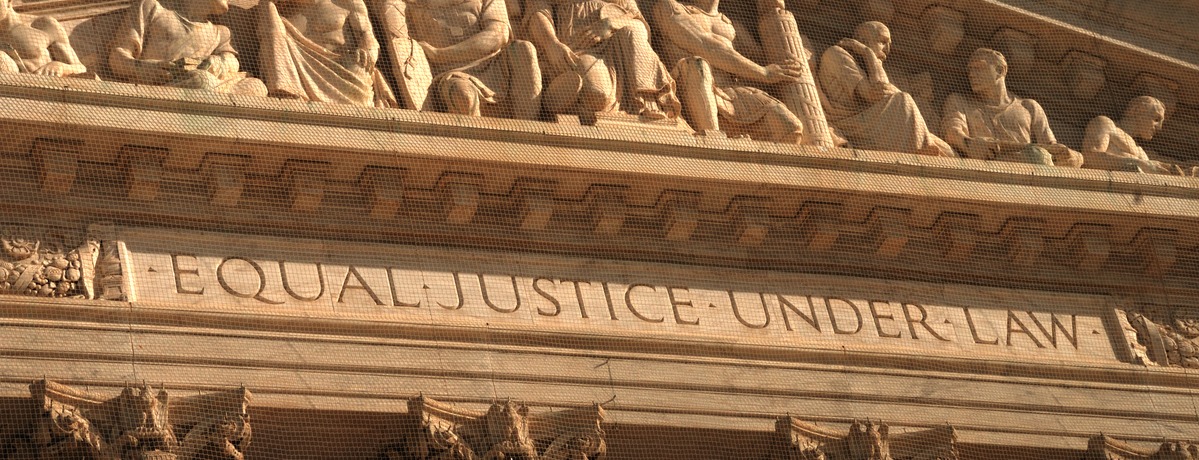On Monday the U.S. Supreme Court announced that it would not entertain arguments in GG v. Gloucester County School Board, a case that would have been the Court’s first significant opportunity to weigh in on gender identity issues. Instead, the Court remanded the matter back to the 4th Circuit Court of Appeals for further consideration in light of the Trump Administration’s recent decision to withdraw federal guidance that instructed public schools to allow students to use the bathroom that corresponds to their gender identity.
Background: Transgender Teen Takes Bathroom Fight to the Supreme Court
Gavin Grimm, or "G.G." in court records, is a student at Gloucester High School. Gavin is a transgender male (i.e., he was born anatomically female). Before the start of his tenth grade year, he asked to be allowed to use the boy’s restroom and to be identified using male pronouns. Initially, the school board granted his request.
However, after Gavin began using the boys’ restroom, members of the community, some of whom referred to Gavin as a "young lady" or "freak," voiced concerns about bathroom privacy and safety. Gavin and his parents said he could not use the girls’ restroom because of the negative reaction to his male presentation. They also cautioned that forcing Gavin to use the girls’ restroom would cause him severe psychological distress, and requiring him to use a private facility would further isolate and stigmatize him.
In December 2014, the school board implemented a policy limiting restroom and locker room use to students with the "corresponding biological genders," allowing "students with sincere gender identity issues" to use an "alternative private facility." Less than a week after the school board issued its policy, an attorney with the Department of Education’s Office of Civil Rights provided an opinion letter that provided, "a school generally must treat transgender students consistent with their gender identity.” This letter was unpublished and did not carry the force of law.
With the help of the American Civil Liberties Union (ACLU), Gavin filed suit in June 2015. He alleged that by denying him access to the restroom that corresponded with his gender identity, the school board impermissibly discriminated against him on the basis of his sex in violation of Title IX of the U.S. Education Amendments of 1972 (a federal law that prohibits sex discrimination by schools) and the Equal Protection Clause of 14th Amendment to the United States Constitution. Among other things, Gavin cited to the Department of Education’s opinion letter. Gavin also sought an injunction so that he could use the boy’s restroom as of the start of the 2015-2016 school year.
In September 2015, the district court dismissed Gavin’s lawsuit and denied his request for an injunction, reasoning that Title IX permits the assignment of separate bathrooms on the basis of one’s biological sex. The district court did not decide whether "sex" includes gender identity. Further, the district court declined to give any weight to the Department of Education’s interpretation of "sex," as expressed in its opinion letter. Gavin appealed the decision to the United States Court of Appeals for the 4th Circuit (the federal appellate court for Maryland, North Carolina, South Carolina, Virginia and West Virginia).
The 4th Circuit reversed the district court’s decision in April 2016, saying the lower court failed to give weight to the Department’s interpretation of "sex."
The 4th Circuit reversed the district court’s decision in April 2016, saying the lower court failed to give weight to the Department’s interpretation of "sex." The appellate court recognized that Title IX provides that entities receiving federal funding―such as public schools―shall not discriminate on the basis of a person’s sex. It also recognized that Title IX allows public schools to provide separate restrooms and other facilities on the basis of sex, so long as the facilities for both sexes are comparable. The appellate court noted, however, that Title IX is silent as to how these provisions apply to transgender students.
The Department of Education attempted to resolve this ambiguity with the interpretation it expressed in the opinion letter. The Department’s interpretation was the result of the Departments’ "fair and considered judgment," and was not plainly erroneous or inconsistent with Title IX. Accordingly, the appellate court held that the Department’s interpretation deserved deference. Simply that the opinion letter issued in response to the school board’s implementation of the policy did not change this outcome. The appellate court then sent the matter back to the district court.
On remand, and after a few other procedural hurdles, the district court entered the preliminary injunction that it had previously denied. This time the school board appealed. While the appellate court initially declined to do so, the matter was ultimately stayed―or put on pause―pending a resolution by the U.S. Supreme Court.
Meanwhile, in May 2016, the Department of Education and the Department of Justice jointly published a "Dear Colleague Letter," which instructed public educational institutions to allow transgender students to use the bathrooms, locker rooms, and other facilities that correspond with their gender identity. This sparked a lawsuit by 13 states. Although the instruction was subsequently blocked by a court (read more here), it solidified the Department of Education’s stance on transgender student rights in public schools.
In October 2016, the parties obtained the ultimate legal golden ticket: the Supreme Court agreed to hear the case. Specifically, the Court agreed to resolve two questions of law: (1) whether unpublished agency letters that do not carry the force of law and that are adopted as part of the very dispute in which deference is sought are entitled to deference; and (2) whether, with or without deference, the Department of Education’s interpretation that Title IX requires transgender students in public schools to be treated consistent with their gender identities should be given effect.
The Case is Remanded
On February 22, 2017, just over a month after taking office, the Trump Administration withdrew the opinion letter that was the crux of the appellate court’s opinion. The Court asked the parties to explain what impact the Trump Administration’s decision had, if any. In advocating for their respective positions, both sides encouraged the Court to hear the case despite the Trump Administration’s position.
Today, however, in a one-sentence order, the Court declined to do so. Instead, it sent the matter back to the 4th Circuit for further consideration in light of the "new" Department of Education’s guidance.
Where Do Schools And Employers Go From Here?
By remanding this matter, the Supreme Court has managed to dodge (at least for now) a cause célèbre of the Obama administration: transgender rights. Despite this anti-climactic order, the bathroom debate has hardly been resolved. Not only are bathroom bills (i.e., proposed laws requiring gender congruent restroom usage) popping up across the country, but so are more expansive state-based civil rights laws (i.e., laws prohibiting discrimination on the basis of transgender status).
This changing landscape, combined with the expanding defining of "sex" under Title VII of the Civil Rights Act and the Occupational Safety and Health Administration’s guidelines that require employers to give transgender employees access to the restroom that corresponds with their gender identity, illustrates that an employer should be mindful before implementing bathroom policies. Employers would also be wise to consider other best practices for managing the transgender workforce. This may include amending their anti-discrimination and harassment policies to include transgender status gender identity, implementing a transition plan, and educating the workforce on relevant policies.
For public schools, today’s order has no immediate impact, as the federal court’s injunction blocking the Obama administration’s attempted policy is still in effect. Only time will tell how the 4th Circuit decides this matter now that the opinion letter on which it based its original opinion is no longer in place. Regardless of how the appellate court rules, it is an almost certainty that the Supreme Court will once again be asked to enter the fray.
Meanwhile, other legal challengers are vying for the Court’s attention on whether "sex" includes transgender status, and we are on the precipice of a potential dynamic shift with the nomination of Judge Neal Gorsuch (for analysis on his potential impact, read here).
Conclusion
During this tumultuous time, employers of all sizes would be well-served to stay ahead of the curve by proactively addressing issues related to a transgender workforce, and public schools subject to these federal rules should similarly pay attention to these developments.

















